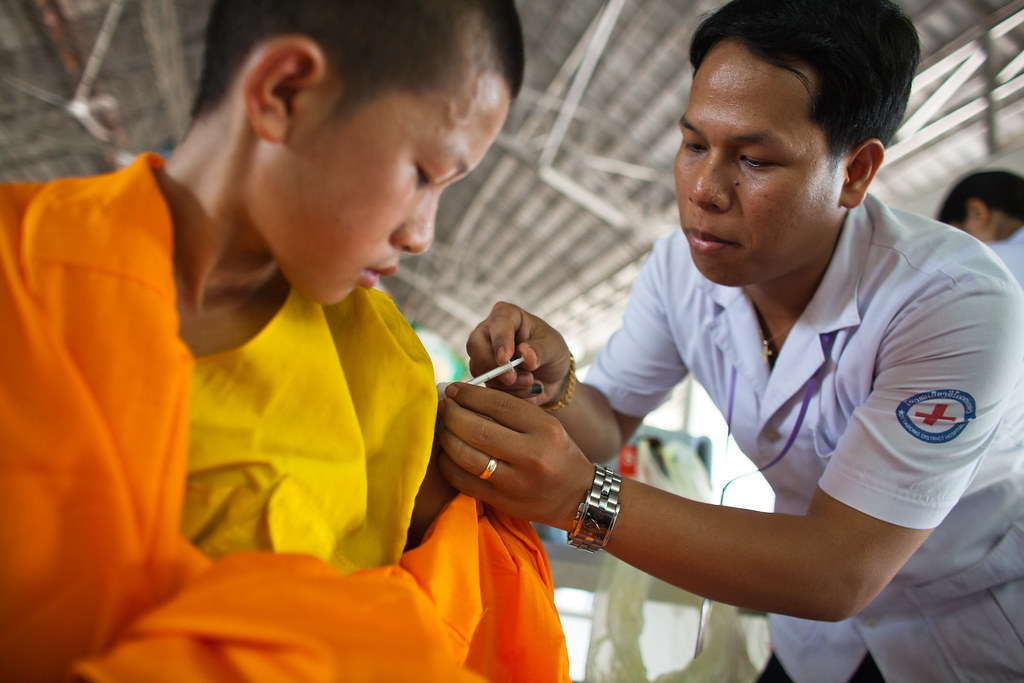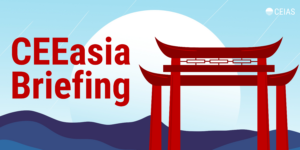Vaccine diplomacy has been on the rise worldwide, and Central Europe’s Czech Republic, Hungary, Slovakia, and Poland are no different with their donations to Vietnam.
The Czech Republic, Hungary, Slovakia, and Poland have joined half a dozen other European countries in donating COVID-19 vaccines to Vietnam, which is currently struggling through a surge in infections and has one of Asia’s lowest vaccination rates.
In late July, the Czech Republic announced it would donate more than 210,000 AstraZeneca and 40,800 Moderna doses to Vietnam, which arrived in Hanoi on August 30th. Vietnam became the first non-European country to which Poland has given such support after Warsaw announced its vaccine donation of around 500,000 doses in mid-August. Hungary announced its donation of 100,000 doses on August 11th. More than 100,000 doses donated by Slovakia arrived in Hanoi on September 12th. The Central European states have also donated testing equipment and PPE.
Lobbying
Vietnam has engaged in targeted appeals for vaccine donations from foreign governments, especially as its infection rate soared after July. Vietnam recorded only 1,465 infections in the whole of 2020 but has recorded 607,684 cases since July 1st this year. In July, senior Vietnamese officials began reaching out to foreign leaders to appeal for vaccine donations. On August 13th, the Vietnamese government established a working group on vaccine diplomacy, led by Foreign Minister Bui Thanh Son.
Government-to-government lobbying appears to have worked in Central Europe. Writing recently in a Vietnamese newspaper, the Polish Ambassador to Vietnam, Wojciech Gerwel, noted: “On August 21, exactly one month after the letter from Prime Minister Pham Minh Chinh to Polish Prime Minister Mateusz Morawiecki, Poland delivered a donation of 501 600 doses of AstraZeneca vaccine to Vietnam.” A Polish government statement, issued on August 20th, said that Warsaw decided on the donations “In response to a call by the Vietnamese authorities.” Writing in Vietnamese-language media in late August, Nguyen Thi Bich Thao, the Vietnamese ambassador to Budapest, who arrived in July, noted that “our efforts in vaccine diplomacy…have been taken into consideration by the Hungarian government.”
It is not clear when the Czech government decided to donate vaccines. Local media reported on July 28th that Prime Minister Andrej Babis instructed his health minister, Adam Vojtěch, to submit to the cabinet a plan to donate vaccines to Vietnam. In June, Babis had said that he might visit Vietnam during the summer, a trip derailed by the infection spike in Vietnam. (Local media quoted him as saying that he wanted to use his “very friendly relationship” with the Vietnamese state president, Nguyen Xuan Phuc, to press for more Czech exports to Vietnam.) Babis also had an online meeting with Vietnamese Prime Minister Chinh on August 9th, after the donation announcement. It was reported that Babis promised to press other European leaders to donate vaccines, too.
On September 12th, around 100,000 AstraZeneca vaccine doses arrived in Vietnam, donated by Slovakia. It is believed that this donation came as the result of the visit to Europe by the chairman of the Vietnamese National Assembly, Vuong Dinh Hue. (Belgium also agreed to donate vaccines to Vietnam during Hue’s visit.) Hue visited Europe between September 5th-11th to speak at the World Conference of Speakers of Parliament in Vienna and to attend bilateral talks with Belgium and Finland. He also came to lobby for more EU member states to ratify the EU-Vietnam Investment Protection Agreement (EVIPA), a corollary to the EU-Vietnam Free Trade Agreement that came into force in mid-2020. The EVIPA is delayed until ratification by a majority of parliaments of EU member states. The Czech Republic and Hungary are among the seven member states that have approved it, according to European Commission information.
Hue, who became National Assembly chair earlier this year, studied in former Czechoslovakia at the University of Economics in Bratislava during the late 1980s, where he also served as head of the association of Vietnamese students in Bratislava. On September 5th, as soon as he arrived in Europe, he met with the Vietnamese ambassadors to the Czech Republic, Slovakia, Hungary, Poland, Slovenia, and Germany. At that meeting, he reportedly instructed them to step with their vaccine diplomacy in their host countries. It was presumably after this meeting that the Slovak government decided to donate the vaccines. The Slovak government formally handed them over at an event held in Helsinki on September 11th, as part of Hue’s official visit to Finland. Key bilateral aid agreements were announced between Vietnam and other European countries at the same event.
The second avenue of lobbying appears to have been through the quasi non-governmental “Friendship Associations” that exist between Vietnam and the Central European states, most of which date back to the communist era of Central Europe, as well as through the Vietnamese Communist Party-run Vietnamese Overseas Associations. On July 25th, Marcel Winter, the Honorary Chairman and Spokesman of the Czech-Vietnamese Society, wrote to the Czech government appealing for it to donate excess vaccines to Vietnam. A third avenue for lobbying has come from European businesses. In mid-July, it was reported that the European Chamber of Commerce in Vietnam had written to EU ambassadors in Vietnam to appeal for vaccine donations.
Repaying favors
Vietnamese relations with the Central European states are historically good, dating back to the communist era for Central Europe. They were among the few world states that had diplomatic relations with Vietnam during the 1980s when it was an international pariah. The cultural and political ties have remained strong in the post-communist era for Central Europe.
The Central European states have made clear that through their vaccine donations they are repaying the charity shown by Vietnam and the Vietnamese people when Europe was the epicenter of the pandemic in 2020. In May of last year, the Vietnamese National Assembly donated 20,000 masks to the Czech parliament.
Much support has come from the large ethnic-Vietnamese diaspora groups in Central Europe, who have been celebrated for their assistance in relief efforts and money-raising activities. Estimates vary, but there are believed to be more than 80,000 ethnic-Vietnamese in the Czech Republic, 50,000-60,000 in Poland, and less in Hungary. (Estimates vary because of distinctions between local nationals of Vietnamese descent and ethnic-Vietnam, regardless of the place of birth.)
It has been reported that in April 2020 the Overseas Vietnamese Association in Hungary raised nearly €24,000 in just one week for local relief efforts. The funds purchased PPE and other material that was donated to two Budapest hospitals and the local authorities. A formal handover ceremony was attended by the Budapest Deputy Mayor in charge of urban affairs, Kerpel-Fronius Gábor.
In the Czech Republic, the Facebook page “Vietnamci pomáhají” (“Vietnamese are helping”), was started in early 2020 to document the fundraising and assistance of the local diaspora, which was well-documented in local Czech media. “For the Czech Vietnamese, often born in the country, it is a manifestation of solidarity with a country they consider home and their actions are highly praised by the media, society and political representation,” Dominik Vu, a trainee at the Czech Embassy in Hanoi, wrote in an article for Vietnamese media in April 2020. On August 9th, the Czech Prime Minister tweeted, referring to Vietnam, that “They are friends, they helped us in the first wave and now it’s our turn.”
“At the beginning of the pandemic, Poles experienced many spontaneous gestures of support from the Vietnamese community in Poland,” Gerwel, Poland’s Ambassador to Vietnam, wrote this month in the Vietnam Investment Review. As well as donations of PPE, “Vietnamese restaurants cooked meals free of charge for Polish doctors, nurses, and paramedics,” he added, referring to a campaign that took the social media hashtag #WNJestzWami (“Vietnam is with you”). “The Vietnamese diaspora in Poland certainly contributes to closer relations between Poland and Vietnam,” Polish Foreign Affairs Minister, Zbigniew Rau, reportedly said while speaking with Vietnam’s new Foreign Minister, Son, in April of this year. The link was made more explicit by Poland’s Deputy Minister of Foreign Affairs, Paweł Jabłoński. “We still remember the spontaneous gestures of support of the Vietnamese community that Poland experienced at the beginning of the COVID-19 pandemic. As the epidemiological situational [sic] in Vietnam worsens significantly, we feel obliged to act in a similar fashion,” he said in a statement after announcing the donation of around 500,000 vaccines last month.
Self-interest
Commentators have suggested that one reason for Vietnam’s sluggish vaccination campaign was Hanoi’s hesitancy to accept donations of Chinese-made vaccines. Anti-China nationalism is rife in Vietnamese society and the Hanoi government was concerned that using Chinese-made vaccines would lead to widespread vaccine hesitancy or even criticism of the government for being unpatriotic. As such, Vietnam is one country where Western attempts at “vaccine diplomacy” are relatively unchallenged by China, although Hanoi has now accepted some Chinese-made vaccines.
Such geostrategic concerns were unlikely to be motivations for Poland and Hungary to donate vaccines to Vietnam. Moreover, Hungary is considered one of China’s closest partners in Europe. However, the Czech Republic has seemingly engaged in counter-China “vaccine diplomacy” after it also donated a symbolic 30,000 vaccines to Taiwan. Slovakia has also promised to donate vaccines to Taiwan.
It is possible that ruling politicians in the Czech Republic and Hungary, who will contest general elections in October and early next year, respectively, saw vaccine donations to Vietnam as a way of boosting their appeal in ethnic-Vietnamese communities at home. Though they are not a significant share of the electorate, they could be important in what are expected to be tightly fought elections. On September 4th, Czech Prime Minister Babis led a senior delegation on a tour of the main Vietnamese market in Prague, known as Sapa.
Vietnam is one of Asia’s fastest-growing economies. For the Central European states, Vietnam is now their largest or second-largest trading partner in the ASEAN bloc. And bilateral trade is growing. Czech-Vietnam trade grew to US$1.5 billion in 2020, up 22 percent from 2019, according to recent comments made by the Vietnamese ambassador to Prague, Thai Xuan Dung. In the first half of 2021 trade increased again, by 28 percent year-on-year. Vietnam’s trade with Poland has reportedly risen to US$3.7 billion in 2020 and US$2.3 billion in the first half of 2021, compared with US$3.5 billion in 2019 and US$3.3 billion in 2018.
US and European businesses have lobbied their respective governments to donate vaccines to Vietnam, in part because the pandemic surge has affected Vietnam’s growing importance to global supply chains. As of late August, the US had donated more than 6 million vaccines to Vietnam. International trade with Vietnam, including from Central Europe, depends on the country getting its infection numbers under control and rapidly improving its vaccination program. As of September 13th, Vietnam has only fully vaccinated 5.5% of its population.
In an aforementioned tweet by Czech Prime Minister Babis, on August 9th, he stated the reason for vaccine donations to Vietnam was because “they are friends, they helped us in the first wave and now it’s our turn.” But he prepositioned this comment with an earlier tweet, regarding his conversation that day with the Vietnamese prime minister. “I was supposed to be in Vietnam these days, I planned to help our companies with exports, I would open another door to this market for them,” he noted. Indeed, when Babis spoke to his Vietnamese counterpart on August 9th, they also discussed ways of boosting economic cooperation.
On September 1st, the Czech Deputy Minister of Foreign Affairs, Martin Tlapa, held an official meeting with the Vietnamese ambassador in Prague, Thai Xuan Dung. A Czech readout notes that the donated vaccines were discussed, as was how Czech companies could invest more in Vietnam’s energy, defense, ICT, and healthcare sectors. On September 10th, the Czech Ministry of Finance organized its first Czech Republic-Vietnam trade forum, attended by Czech Deputy Prime Minister and Finance Minister Alena Schillerova, who days earlier had joined Prime Minister Babis on a meet-and-greet in ethnic-Vietnamese communities in Prague.
After announcing its vaccine donations, Poland’s ambassador in Hanoi, Gerwel, held a meeting with Vietnamese Prime Minister Chinh on August 17th. In an article Gerwel wrote for the Vietnam Investment Review, published on September 7th, he argued that as a result of improving Polish-Vietnamese relations there could be a boost in Polish food exports to Vietnam, and more investment from its MedTech and ICT. sectors. “As in many times in history, the two countries have proven to be loyal partners once again. The new economic circumstances have also made it evident that there are many promising fields for enhanced cooperation,” he wrote.
The Central European states appear to have been referenced more often than usual in Vietnamese media since they pledged to donate the vaccines. The vaccine donations have also seemingly spurred an increased number of meetings and forums between the Central European government and Vietnamese officials. It has been reported that Vietnam’s Prime Minister Chinh extended an invitation for a state visit to his Czech and Polish counterparts after their vaccine donations. It is not clear if an invite was extended to Hungary’s prime minister, Viktor Orban.
As has been common in all “vaccine diplomacy” efforts globally, Central European ambassadors in Vietnam have conducted elaborate handover ceremonies. When more than 500,000 vaccines were donated by Poland, they were first handed over at a ceremony at Warsaw’s Chopin Airport, attended by the Vietnamese Ambassador to Poland, Nguyen Hung, and the Polish Deputy Foreign Minister, Jabłoński. After the doses were flown to Hanoi, the Polish Ambassador to Vietnam, Gerwel, then formally handed them over to the Vietnamese Deputy Minister of Health, Truong Quoc Cuong, who then gave a customary thank-you speech to the Polish government. Cuong also took delivery of almost 250,000 vaccines donated by the Czech Republic, which were formally handed over on August 30th by Lukas Musil, Czech deputy ambassador to Vietnam. After Poland on September 11th donated PPE and other medical equipment to Vietnam, Vietnamese Foreign Minister, Son, wrote on Twitter: “ We truly appreciate the support that Poland is giving to Viet Nam.”








